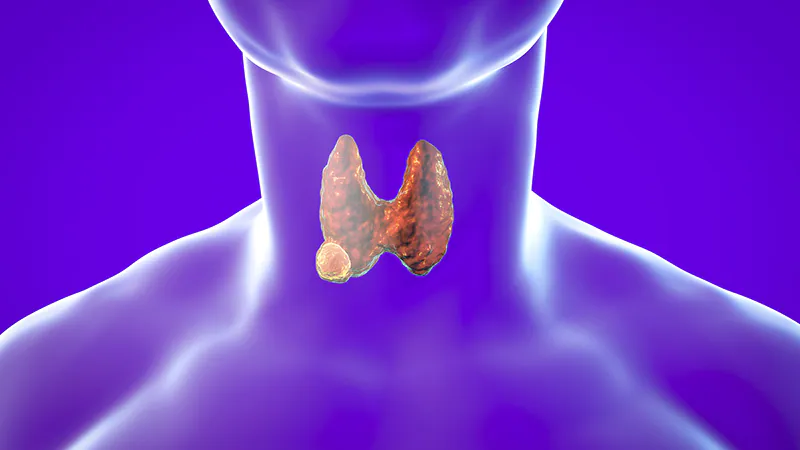Introduction to Thyroid Cancer
Thyroid cancer is a form of cancer that originates in the thyroid gland, a butterfly-shaped organ located at the base of the neck. The primary function of the thyroid gland is to produce hormones that regulate various metabolic processes in the body, including growth, development, and metabolism. Thyroid cancer occurs when the cells in the thyroid gland begin to grow uncontrollably, leading to the formation of malignant tumors. This type of cancer is relatively rare compared to other malignancies, but its incidence has been on the rise in recent years, particularly in females.
Statistically, thyroid cancer represents about 1% of all cancer cases, making it one of the less common cancers. However, it is noteworthy that thyroid cancer is the most prevalent endocrine malignancy. The various types of thyroid cancer include papillary, follicular, medullary, and anaplastic thyroid cancer, each differing in aggressiveness, treatment options, and prognosis. Papillary thyroid cancer, for instance, is the most common and generally has an excellent prognosis, while anaplastic thyroid cancer is rare but much more aggressive.
Several risk factors have been associated with the development of thyroid cancer. These include a history of radiation exposure, particularly to the neck area, family history of thyroid disease or genetic syndromes like multiple endocrine neoplasia, and certain pre-existing conditions like goiter. Additionally, being female and middle-aged can increase susceptibility to this type of cancer. Understanding the anatomy of the thyroid gland and the factors contributing to the development of cancer within it is crucial for early detection and effective management strategies. In this blog post, we will explore the symptoms, diagnosis, and management approaches for thyroid cancer to provide a comprehensive overview for readers.
Recognizing the Symptoms of Thyroid Cancer
Thyroid cancer often presents with a variety of symptoms that can be subtle in the early stages. One of the most commonly recognized signs of thyroid cancer is the presence of lumps or nodules in the neck. These palpable masses can be detected during self-examinations or medical check-ups and may vary in size. Not all nodules are cancerous; however, any persistent lump, especially one that changes over time, should prompt further investigation by a healthcare professional.
An additional symptom to monitor is changes in voice. Patients with thyroid cancer may experience hoarseness or changes in their vocal tone due to pressure exerted by the thyroid tumor on surrounding structures, including the vocal cords. This symptom is particularly important as it may indicate that the cancer is affecting nearby tissues.
Difficulty swallowing, also known as dysphagia, can arise if a thyroid tumor grows large enough to obstruct the esophagus. Individuals might experience a sensation of tightness in the throat or an inability to consume certain foods due to this discomfort. Similarly, a persistent cough that does not seem to be linked to respiratory infections can be another warning sign. While a cough may have many benign causes, if it is accompanied by other symptoms mentioned, thorough evaluation is necessary.
It is crucial to distinguish these symptoms from other thyroid-related issues such as goiters or benign nodular thyroid disease. An early diagnosis of thyroid cancer significantly impacts treatment options and prognosis. Therefore, awareness of these warning signs and seeking timely medical advice can lead to more effective management strategies.
Diagnosis and Treatment Options
The diagnosis of thyroid cancer involves a series of methodical procedures aimed at accurately identifying the presence of cancerous cells within the thyroid gland. Initially, a physician may perform a physical examination and review the patient’s medical history, followed by imaging tests such as a thyroid ultrasound. This non-invasive procedure is instrumental in visualizing nodules in the thyroid and helps determine if further investigation is necessary.
If a suspicious nodule is detected, a fine-needle aspiration biopsy is usually the next step. During this procedure, a thin needle is inserted into the nodule to extract tissue samples, which are then analyzed for cancerous cells. Additionally, blood tests may be conducted to measure levels of thyroid hormones and to check for tumor markers, such as thyroglobulin, which can provide further evidence regarding the presence of thyroid cancer.
Upon diagnosis, treatment options vary based on the type and stage of the cancer. Surgical intervention often serves as the primary treatment, especially for localized thyroid cancer. The type of surgery can range from a lobectomy, where a lobe of the thyroid is removed, to a total thyroidectomy, whereby the entire gland is excised. In some instances, nearby lymph nodes may also be removed to prevent the spread of cancer.
For patients where surgery is not viable or cancer has spread, alternative treatment methods such as radioactive iodine therapy and external beam radiation therapy may be recommended. These procedures primarily aim to target and destroy cancerous cells while minimizing damage to surrounding healthy tissue. Furthermore, thyroid hormone therapy is often prescribed post-surgery to help maintain normal metabolic function, as the thyroid plays a crucial role in regulating the body’s metabolism.
Overall, treatment plans should be personalized and carefully devised in conjunction with medical professionals considering the patient’s overall health and individual preferences. Such tailored approaches can significantly enhance the quality of life and treatment outcomes for individuals diagnosed with thyroid cancer.
Managing Life After a Thyroid Cancer Diagnosis
Receiving a thyroid cancer diagnosis can be overwhelming, but taking proactive steps towards managing life post-diagnosis is crucial for recovery and long-term health. One of the primary strategies involves adopting lifestyle changes that promote wellness and minimize the risk of recurrence. Regular physical activity, such as walking, swimming, or yoga, can enhance physical health and contribute positively to mental well-being. Integrating at least 30 minutes of exercise into your daily routine can significantly improve energy levels and mood.
Nutritional support is equally important after a thyroid cancer diagnosis. A balanced diet rich in fruits, vegetables, lean proteins, and whole grains can help nourish the body and support the immune system. It may be beneficial to consult a dietitian who specializes in oncology to tailor a meal plan that addresses your specific needs. Additionally, staying well-hydrated and limiting processed foods may aid in recovery and help maintain optimal health.
Emotional well-being should also be a priority during this journey. It’s not uncommon for individuals to experience feelings of anxiety or depression after a thyroid cancer diagnosis. Engaging in mindfulness practices, such as meditation or deep-breathing exercises, can assist in managing stress levels. Furthermore, seeking support from friends, family, or professional counselors can provide valuable emotional resources as you navigate this period. Support groups, either in-person or online, can also offer a sense of community, allowing individuals to connect with others undergoing similar experiences.
Regular follow-ups with healthcare providers are essential to monitor health status post-treatment. These appointments allow for ongoing assessments and adjustments to management plans as needed. Discussing any concerns or symptoms with healthcare professionals can provide peace of mind and ensure that you are receiving the best possible care. By focusing on these multifaceted strategies—lifestyle changes, nutritional support, emotional well-being, and consistent medical follow-ups—individuals can effectively manage their lives after a thyroid cancer diagnosis while striving towards a healthier future.






